#DEI in Remote Work
Explore tagged Tumblr posts
Text
DEI in Remote and Hybrid Work Environments: Navigating the New Norm

The shift toward remote and hybrid work marks a transformative era in workplace dynamics, deeply affecting Diversity, Equity, and Inclusion (DEI) strategies. Ensuring inclusive and supportive hybrid and remote work environments requires a nuanced approach, recognizing the diverse needs and experiences of all employees.
The Preference for Hybrid Work
Approximately 66% of employees express a preference for hybrid work models, valuing the flexibility and balance they offer. This preference is even stronger among traditionally underrepresented groups; for instance, employees with disabilities, nonbinary employees, and LGBQ+ individuals show a higher inclination towards hybrid models, underlining their importance in supporting the needs of a diverse workforce. Flexible work arrangements serve a critical role in catering to the diverse requirements of the workforce, which is significant in fostering an inclusive work environment.
Leaders play an essential role in this, as seen in Salesforce’s approach led by Marc Benioff. Salesforce actively promotes equity by conducting pay audits to eliminate disparities and supports diverse needs through Employee Resource Groups (ERGs), showcasing leadership’s role in advancing DEI in the workplace.
Challenges and Considerations for DEI in Remote Work
While remote work offers significant benefits, including access to a more diverse talent pool and enhanced physical and psychological safety, it also presents unique challenges that require careful navigation, especially concerning DEI efforts. For systematically disadvantaged groups, remote work may introduce or exacerbate issues related to visibility, career progression, and the need for specific accommodations. For instance, professionals with disabilities may find remote work beneficial in terms of accessibility but may also have difficulty demonstrating their work contributions or participating in virtual collaboration due to a lack of awareness among colleagues about their needs.
Deloitte’s report, “Inclusive or isolated? New DEI considerations when working from anywhere” delves into the complex landscape of remote work and its implications for diversity, equity, and inclusion. Highlighting both the opportunities and concerns presented by the shift to remote and hybrid models, the study underscores the need for intentional leadership to navigate these changes effectively. It points out that while remote work can offer greater accessibility and flexibility, it also risks exacerbating issues like isolation and background bias, particularly affecting disadvantaged groups. Solutions include actionable strategies for organizations to enhance inclusivity, such as offering home-office subsidies and expanding remote learning opportunities.
Strategies for Enhancing DEI in Remote and Hybrid Settings
Given the challenges presented by remote work, it’s crucial to explore effective strategies that can enhance DEI in these evolving work settings, such as below:
Personalized Work Models: Tailoring work arrangements to individuals can help address diverse employee needs, fostering a more inclusive environment. This approach, however, requires careful management to align with organizational goals and ensure equity across the workforce. For example, Citigroup employs a 50/50 hybrid model, designating roles as “hybrid,” “remote,” or “resident” to balance in-office and remote work based on job function, showcasing flexibility in accommodating their diverse team members.
Technology and Accessibility: Leveraging technology to enhance accessibility is crucial. This includes ensuring that virtual meetings, communications, and work tools are accessible to employees with disabilities, supporting neurodivergent individuals by mitigating information overload, and providing sensitization training to promote understanding and respect. For example, Microsoft has adopted a policy allowing employees to work from home at least 50% of the time, with options for further remote work upon manager approval. This approach emphasizes the use of technology to support diverse working styles and promote accessibility.
Career Progression Support: It’s vital to ensure that remote and hybrid work models do not hinder the career progression of underrepresented groups. This includes transparent communication about performance and contributions, as well as providing equal opportunities for growth and development. For example, Lockheed Martin has focused on training managers to lead in a hybrid environment, acknowledging that up to 45% of their workforce will be hybrid. This initiative includes 20 hours of leadership training to ensure managers are equipped to support career progression remotely.
As remote and hybrid work models become more prevalent, it’s imperative for organizations to actively plan for and address DEI concerns. By understanding the diverse needs of their workforce and implementing targeted strategies to support inclusion and equity, companies can fully harness the potential of their talent and foster a truly inclusive work environment.
How does your organization currently support DEI in remote or hybrid settings? Have you or your colleagues faced challenges related to DEI while working remotely? How were they addressed? Leave a comment below, send us an email, or follow us on LinkedIn.
0 notes
Text
Seriously though, I'm kinda surprised that a show like Severance is allowed to exist tbh because it's so much like real life and also the scifi part of it is so close to being reality because of people like Elon Musk. It's honestly very chilling. I recommend EVERYONE watch it.
#severance#elon musk#donald trump#tiktok ban#us politics#working class#remote work#work life balance#wokeness#dei
22 notes
·
View notes
Text
The Overall Impact of Technology on Human Resource Management (HRM)

Introduction
The field of Human Resource Management (HRM) has undergone significant transformation in recent years, driven primarily by advancements in technology. From recruitment to employee engagement, technology has reshaped how HR professionals approach their roles. Understanding the impact of technology on HRM is crucial for organizations aiming to stay competitive and create a productive, engaged workforce.
The Digital Transformation of HRM
Digital transformation in HR refers to the integration of digital tools and processes to optimize and enhance HR functions. The shift is motivated by the need for efficiency, data-driven decision-making, and the demand for a better employee experience. Technology is no longer just a support function; it's at the core of modern HR strategies.
Recruitment and Talent Acquisition
One of the most significant impacts of technology on HRM is in recruitment and talent acquisition. Artificial intelligence (AI) and machine learning algorithms are now employed to screen candidates, reducing the time-to-hire and improving the quality of hires. Online job portals and social media platforms have become primary channels for talent sourcing, making it easier for HR teams to connect with top candidates.
Employee Onboarding and Training
Technology has streamlined the onboarding process, making it more efficient and effective. Automated onboarding systems ensure that new hires are integrated smoothly into the organization. In addition, virtual reality (VR) and augmented reality (AR) are being used in training programs, providing immersive learning experiences. E-learning platforms and mobile apps further enhance the accessibility and flexibility of employee training.
Performance Management Systems
The traditional annual performance reviews are being replaced by continuous performance management systems, thanks to technology. Real-time feedback tools and 360-degree assessments allow for ongoing development and improvement. Data analytics play a crucial role in tracking employee performance, providing insights that help HR teams tailor development plans to individual needs.
Employee Engagement and Communication
Technology has revolutionized how organizations engage with their employees. Internal communication platforms like Slack and Microsoft Teams have made collaboration easier and more efficient. Gamification techniques are being used to boost engagement, and mobile apps are enhancing employee satisfaction by providing easy access to HR services. These tools help create a more connected and engaged workforce.
HR Analytics and Decision-Making
HR analytics has emerged as a powerful tool for data-driven decision-making in HRM. By leveraging predictive and prescriptive analytics, HR professionals can optimize workforce planning, identify trends, and make informed decisions. Companies that successfully implement HR analytics are better equipped to respond to changing workforce dynamics and achieve their business goals.
Payroll and Benefits Administration
Automation in payroll processing and benefits administration has significantly reduced errors and improved compliance. Cloud-based HR systems have made it easier to manage these functions, offering a seamless experience for both HR teams and employees. Employee self-service portals allow individuals to manage their benefits, increasing transparency and satisfaction.
Employee Well-being and Work-Life Balance
Technology has also played a crucial role in promoting employee well-being. Wellness apps and virtual health programs are helping employees manage their physical and mental health. Flexible work arrangements, supported by technology, have become more common, allowing employees to balance their work and personal lives more effectively.
Remote Work and Virtual Teams
The rise of remote work has been one of the most significant changes brought about by technology in HRM. Tools and platforms that support remote collaboration have made it possible for teams to work together effectively, regardless of their physical location. While there are challenges in managing virtual teams, the benefits, such as increased flexibility and access to a global talent pool, are substantial.
Diversity, Equity, and Inclusion (DEI)
Technology is also helping organizations advance their diversity, equity, and inclusion (DEI) initiatives. AI-driven tools can reduce bias in hiring and promotions, while diversity analytics provide valuable insights into workforce demographics. However, it's important to ensure that these technologies are implemented fairly and ethically to avoid perpetuating existing biases.
Legal and Ethical Considerations
As HR technology continues to evolve, legal and ethical considerations become increasingly important. Data privacy is a major concern, especially with the large amounts of employee data that HR systems handle. Compliance with labor laws and regulations is also crucial. Organizations must ensure that their use of AI and other technologies aligns with ethical standards and legal requirements.
Future Trends in HR Technology
Looking ahead, the future of HR technology promises even more innovation. Artificial intelligence and automation will continue to play a significant role, with potential applications in everything from recruitment to employee development. Blockchain technology may also emerge as a key player in HR processes, offering increased security and transparency.
Challenges and Limitations of HR Technology
Despite its many benefits, HR technology is not without its challenges. Adoption barriers, such as resistance to change and the digital divide, can hinder implementation. Over-reliance on technology can also lead to a loss of the human touch in HRM. To overcome these challenges, organizations must strike a balance between technology and human interaction.
Conclusion
Technology has undoubtedly transformed human resource management, bringing about greater efficiency, improved decision-making, and enhanced employee experiences. However, it's important to remember that technology should complement, not replace, the human element in HR. As organizations continue to navigate the digital landscape, HR professionals must remain adaptable and forward-thinking, ensuring that they leverage technology to its fullest potential while maintaining a focus on the well-being and development of their employees.
0 notes
Note
I want to speak out against the whole push towards DEI. I feel that ever since you made the push to make identity the forefront of a character it has hurt the stories you tell. Captain Sisay's race was never the focus of her character and she was a complete badass! And I fear if you did it over again Gerrard would be trans, black and disabled just because. It also cheapens the stories of world devastation when characters worry more about their gender than Bolas destroying everything.
The reason I started this blog is so we can have frank conversations about things, so please let’s talk about this.
Imagine if every time you turned on the TV or watched a movie, no one looked like you. For some of us, that’s never happened. We see ourselves constantly, so it’s hard to truly understand what not seeing yourself represented in media is like.
I do have a personal window to this experience. While I am white and male, there’s an area where I am the minority - my religion. Jews are just under two and a half percent of the US population. I have had many experiences where I’ve been in situations where everything is geared towards a group I do not belong to, and zero consideration is given that not everyone at that event is part of the majority.
You just feel invisible and like an outsider. It’s not a great feeling. And I just experience it a tiny portion of time, only things that are geared specifically towards something religious. Most minorities have this feeling all the time, whenever they’re outside their personal community.
Now imagine, after years of not seeing yourself ever, you finally see someone that looks like you, but nothing about the character rings remotely true. They don’t sound like you, they don’t act like you, the facts about their day-to-day life are just wrong. It’s clear whoever wrote the character didn’t truly understand the lived experience of the character, so the character feels fake.
You bring up Sisay. Michael Ryan and I didn’t technically create Sisay (she played a small role in the Mirage story), but we did do a lot to flesh out her character as the creators of the Weatherlight Saga. We turned her from a minor character into a major one.
And while I’m proud, in general, of our work on the Weatherlight Saga, I don’t think we did justice to Sisay as a character. Neither Michael nor I have any knowledge of what it’s like to be a black woman. Nor did we ever talk to someone who did.
And if you’re someone like us that has no knowledge of that experience, you probably didn’t notice. But that doesn’t mean it’s a good thing.
Imagine if we made a movie about your life, and we just made everything up. We invented people you never knew, we gave you a job you never had, and we had you say things you’d never say. The movie might even be a good movie, but your response would be, but that’s not my life - that’s not me.
Now imagine we put the movie out, and people that never met you assumed that was what you were like. When people met you for the first time, they assumed things, because, you know, they’d seen the movie.
That’s what misrepresenting people does. It not only makes them feel not seen, it falsely represents them, spreading lies, often stereotypes, making people believe things about them that aren’t true.
Our move towards diversity is just us trying to better reflect the world and the people in it. We’re trying to do to everyone else what a certain portion of people get every day without ever having to think about it.
But why are we “making it the forefront of their character”? We’re not. We’re making it a part of their character. But in a world where you’re not used to ever seeing it, it feels louder than it is. Things that are a natural part of the world that you’re used to feel like the background of the story because you understand the context to it.
If a man kisses his wife before going off to a battle, that’s not a big deal. It’s just a thing a husband might do to his wife when he leaves. It’s not the forefront of his character. It’s just part of his life. But you’ve seen it hundreds of times, so it feels normal.
When someone does something that isn’t your lived experience it pulls focus. It seems like a big deal, but only because it’s new to you. It’s just as mundane a thing to that character as the man kissing his wife is to him.
Even the turn “pushing” implies that it’s unnaturally here, that we’re forcing something that naturally shouldn’t be. But why? That thing exists naturally in the real world, and it doesn’t make the real world any less. Maybe you’re less aware of it, but is making you aware of how others live their life “pushing” something on you?
How you live your life is represented constantly, everywhere. Why isn’t over-representing your experience at the expense of everyone else’s “pushing” it? Why is media only being the experience of those in power the “proper way”?
Having more depth and variety doesn’t lessen stories. It makes them deeper, more rich, more nuanced. In short, it makes them better stories. In my former life, I was a professional writer. I took a lot of writing classes. One of the truism of writing is “speaking truth leads to better stories”.
There’s another famous quote: “When you’re accustomed to privilege, equality feels like oppression.” You’re used to being over-represented, so being a little less over-represented feels like something has been taken from you. But really it hasn’t. Having a better sense of the rest of the world comes with a lot of benefits.
I’ll use food as an example. Let’s say all you were ever exposed to was the food of your heritage. Yeah, that food is really good, but sometimes isn’t it nice to eat foods of other nationalities? Isn’t your life better that you have a choice? Isn’t your exposure and access to the food of other nationalities a positive in your life?
Exposure to variety is a positive. It allows you to learn about things you didn’t know, experience things things you’ve never experienced, and get a better sense of understanding of your friends and neighbors.
Our actions are not to harm anyone, and if you think that’s what we’re doing, please take a minute to actually absorb what I’m saying. You’ve spent your whole life metaphorically eating one type of food, and we’re just trying to show you how much you’ve missed out on.
And while this might not impact you directly, we’re making a whole bunch of people felt seen. We’re bringing joy. Think of it this way. We make a lot of cards. Not every card is for you. But if it makes someone else happy, if they get to include it in a deck, and it makes Magic better for them, how is it harming you that we include it? You have so many cards that you can play.
To this poster or people that share their viewpoint, the narrative that a gain for someone else is an attack on you is just not true. As I just pointed out above, you play a game all about personal choice, about players getting to choose how they play and enjoy the game. Why should life be any different than Magic?
Thanks for reading.
4K notes
·
View notes
Note
I've been working to get a job with the US government for some time via Schedule A (hiring for persons with disabilities) for some time, because remote work is a necessity for me. I finally have the paperwork and qualifications, and I'm ready to apply and contact the SPPC for the agency, but right now I'm having doubts about whether I should.
The worst possible thing would be to lose my current stability trying for something better, only to get fired because the current administration doesn't understand that their agencies need manpower.
From your perspective, is it a good time to try to get hired by a gov agency? Or are new hires first on the chopping block?
Heya. I hope you don't mind me making this public, as in the past, I have recommended gov work to folks, and now... not so much.
You unfortunately have several things against you right now entering federal work (I say this as a federal contractor with a .gov email who gets all the stupid internal memos):
1) Probationary hires (including career employes who have merely changed departments) have been getting fired en masse without any consideration for qualifications. Most departments have a hiring freeze right now as well.
2) There is a "return to work" policy requiring remote folks even 50 miles away from a physical office to somehow get in one by July 28. Folks within 50 miles have to return by May 5. There is language about getting exceptions, but I doubt any will be granted.
3) The DEI purge is including Accessibility (a lot of the internal memos say "DEIA", so they are very openly targeting disabled people).
4) It is exceedingly chaotic right now. New memos go out at least weekly. No one still really knows what is going on.
I would honestly set your sights on state and municipal government, if you want to work in the public sector. The best federal folks to resist right now are current employees. The barrier to entry for new employees is near-impossible right now.
I wish I had better news, because civil service has generally been awesome and a way to serve your country for the greater good, but it's in the shitter right now. I, myself, expect to not be approved for any future contracts due to being trans. :/
Hang in there, and I hope other opportunities present themselves to you. But don't put yourself in jeopardy seeking federal work right now.
83 notes
·
View notes
Text
“One Beautiful Bill” Would Be a Tragic Setback for Indian Country
Guest Opinion. The name “One Beautiful Bill” might sound harmless, charming, even, but for Indian Country, its passage would be nothing short of a policy earthquake. Behind the rhetoric of fiscal responsibility and government streamlining lies a sweeping assault on the foundational programs that uphold tribal sovereignty, self-determination, and the bare minimum of equitable federal support that Native Nations have fought to establish over generations.Modeled on recent proposals that promote anti-DEI (Diversity, Equity, Inclusion) measures, budget austerity, and bureaucratic consolidation, this bill threatens to gut critical federal programs that support Native communities. It is a direct challenge to the federal trust and treaty obligations owed to tribes, a responsibility that predates the founding of the United States and has been reaffirmed repeatedly in federal law.The Bureau of Indian Affairs (BIA) and Bureau of Indian Education (BIE), already chronically underfunded, are squarely in the crosshairs. The bill targets Tribal Priority Allocations (TPA), flexible funding used for core government services like law enforcement, social services, and road maintenance. The Housing Improvement Program (HIP), which assists Native families in dire housing need, is viewed as duplicative and dispensable. BIE programs for early childhood education and tribal colleges, which struggle under current funding levels, could be further diminished or eliminated altogether.The assault extends far beyond the Department of the Interior. The Indian Health Service (IHS), the most direct manifestation of the federal trust responsibility in healthcare, faces cuts to vital services like Purchased/Referred Care, the Community Health Aide Program, and urban Indian health initiatives. Worse still, advance appropriations that protect IHS from government shutdowns could be reversed, once again jeopardizing lives with every budget crisis.The bill’s impact on tribal housing and economic self-sufficiency would be devastating. It threatens the elimination or downsizing of the Indian Housing Block Grant (IHBG) and the Indian Community Development Block Grant (ICDBG), cornerstones of housing infrastructure across Native communities. Programs that support Native entrepreneurship through the SBA 8(a) program and the Office of Indian Economic Development could be slashed or rationalized out of existence.Education, language revitalization, and cultural preservation efforts face a similar fate. The Office of Indian Education and its work funding tribal education departments and Native language programs could be framed as “non-core” and eliminated. Food security programs like the Food Distribution Program on Indian Reservations (FDPIR), critical to many rural and remote tribal communities, are also at risk, dismissed as duplicative of SNAP without any understanding of their unique implementation in Indian Country.Environmental protections, transportation equity, justice programs, and the very infrastructure for federal-tribal financial relations, every one of these areas would suffer under “One Beautiful Bill.” The Department of Justice’s tribal set-asides, tribal transportation funding formulas, EPA’s General Assistance Program, and even the Treasury’s Tribal Office and ARPA oversight functions are all on the chopping block. These aren’t luxuries, they’re necessities for self-governance, public health, and environmental and cultural survival.The common thread among targeted programs is telling: they are discretionary, equity-based, and uniquely tribal. They are not “wasteful government spending”, they are the instruments through which tribal governments serve their citizens and exercise the rights promised to them by treaty and law.Make no mistake: if passed, this bill would not just cut programs, it would unravel the framework of modern tribal self-determination, a framework built over the past 51 years with bipartisan support. It would erase decades of hard-won pro
45 notes
·
View notes
Text
“One Beautiful Bill” Would Be a Tragic Setback for Indian Country
Guest Opinion. The name “One Beautiful Bill” might sound harmless, charming, even, but for Indian Country, its passage would be nothing short of a policy earthquake. Behind the rhetoric of fiscal responsibility and government streamlining lies a sweeping assault on the foundational programs that uphold tribal sovereignty, self-determination, and the bare minimum of equitable federal support that Native Nations have fought to establish over generations.Modeled on recent proposals that promote anti-DEI (Diversity, Equity, Inclusion) measures, budget austerity, and bureaucratic consolidation, this bill threatens to gut critical federal programs that support Native communities. It is a direct challenge to the federal trust and treaty obligations owed to tribes, a responsibility that predates the founding of the United States and has been reaffirmed repeatedly in federal law.The Bureau of Indian Affairs (BIA) and Bureau of Indian Education (BIE), already chronically underfunded, are squarely in the crosshairs. The bill targets Tribal Priority Allocations (TPA), flexible funding used for core government services like law enforcement, social services, and road maintenance. The Housing Improvement Program (HIP), which assists Native families in dire housing need, is viewed as duplicative and dispensable. BIE programs for early childhood education and tribal colleges, which struggle under current funding levels, could be further diminished or eliminated altogether.The assault extends far beyond the Department of the Interior. The Indian Health Service (IHS), the most direct manifestation of the federal trust responsibility in healthcare, faces cuts to vital services like Purchased/Referred Care, the Community Health Aide Program, and urban Indian health initiatives. Worse still, advance appropriations that protect IHS from government shutdowns could be reversed, once again jeopardizing lives with every budget crisis.The bill’s impact on tribal housing and economic self-sufficiency would be devastating. It threatens the elimination or downsizing of the Indian Housing Block Grant (IHBG) and the Indian Community Development Block Grant (ICDBG), cornerstones of housing infrastructure across Native communities. Programs that support Native entrepreneurship through the SBA 8(a) program and the Office of Indian Economic Development could be slashed or rationalized out of existence.Education, language revitalization, and cultural preservation efforts face a similar fate. The Office of Indian Education and its work funding tribal education departments and Native language programs could be framed as “non-core” and eliminated. Food security programs like the Food Distribution Program on Indian Reservations (FDPIR), critical to many rural and remote tribal communities, are also at risk, dismissed as duplicative of SNAP without any understanding of their unique implementation in Indian Country.Environmental protections, transportation equity, justice programs, and the very infrastructure for federal-tribal financial relations, every one of these areas would suffer under “One Beautiful Bill.” The Department of Justice’s tribal set-asides, tribal transportation funding formulas, EPA’s General Assistance Program, and even the Treasury’s Tribal Office and ARPA oversight functions are all on the chopping block. These aren’t luxuries, they’re necessities for self-governance, public health, and environmental and cultural survival.The common thread among targeted programs is telling: they are discretionary, equity-based, and uniquely tribal. They are not “wasteful government spending”, they are the instruments through which tribal governments serve their citizens and exercise the rights promised to them by treaty and law.Make no mistake: if passed, this bill would not just cut programs, it would unravel the framework of modern tribal self-determination, a framework built over the past 50 years with bipartisan support. It would erase decades of hard-won pro
45 notes
·
View notes
Text
Wajahat Ali at The Left Hook:
Elon Musk showed the world that buying the U.S. presidency only costs about $300 million. This is like shopping at The Dollar Store for the world’s richest man. I grudgingly tip my hat to Musk, an immigrant, who is an aficionado of Nazi salutes much like his Hitler-supporting grandparents who moved to South Africa because they were inspired by the Apartheid regime. Musk’s $290 million was a small risk with a massive return on investment. Money alone didn’t move the needle. He also bought Twitter at a loss so he could take over a major social media site and use it to promote misinformation, conspiracy theories, and platform white supremacists and hate-mongers like Tommy Robinson and Nick Fuentes.
He went all-in with Donald Trump after saying he wouldn’t donate to any candidate because he realized Trump is an unethical criminal who would treat the Oval Office like an ATM. It’s all quid pro quo. Donald has returned the favor by allowing Musk to roam free around Mar-a-Lago, join phone calls with world leaders, dine with tech billionaires who bent the knee, and he even publicly thanked him for helping with those “vote counting computers” in Pennsylvania. So far, whatever Musk wants, he gets. Musk decided to torpedo the bipartisan government spending deal via Twitter and Republicans almost shut down the government to appease him. Musk went all-in with H1B visas and referred to MAGA who criticized him as “contemptible fools” and “retards,” and Trump did a 180 on the issue and sided with him.
So, why be content with just the appetizers? Why not raid the fridge and grab everything, including the cake, the cookies, and all the crumbs? Musk has a voracious appetite and the United States of America as his “all you can eat” buffet. As Donald Trump yells at the clouds and threatens to make Canada the 51st state for balking at “the dumbest trade war in history,” Musk is busy gaining access to all of our financial data. On Friday, David Lebryk, a top civil servant at the Treasury Department, was pushed out of his job after he refused to give DOGE, the Department of Government Efficiency headed by Musk, access to the system. Please note Musk is a private citizen and not a federal employee. We still don’t know the scope of DOGE’s role, its limits, its budget, its staff, or whether it will function as a department of the government or exist as an independent organization. What we do know is DOGE is behaving like a Trojan Horse and has allowed Elon Musk to gain access to the Treasury’s federal payment system, which includes every US taxpayer’s personal information. Through DOGE, Musk has promised to eliminate wasteful spending, which according to him includes ending DEI programs, “defanging” regulators like the Securities and Exchange Commission and FTC which have investigated his businesses, privatizing the US postal service, “deleting” the IRS, and ending remote work. However, he wants to improve defense spending, so he will continue receiving government subsidies for his SpaceX which will produce rockets that explode in the sky and give Americans the most expensive fireworks.
Another target on his chopping block is eliminating humanitarian spending. He’s accomplishing that goal by attacking USAID, which provides life-saving support to marginalized communities around the world. But to Musk, who loves the pro-Nazi AfD party, USAID is an “evil” and “criminal organization” that deserves to die. As of Sunday, USAID’s X account and website are no longer available. People around the world, such as children in Sudan, Gaza, and Ukraine, will die as a result of this cruel, unnecessary action, but, hey, none of that matters to the “pro-life” MAGA movement. On Saturday night, two top security officials from the agency were put on leave because they refused officials from DOGE access to private systems. Thanks to Musk’s interference, the head of the FAA was also forced to resign, which led to the United States being without an FAA chief during a preventable and tragic airline collision in DC that claimed nearly 70 lives. Musk didn’t appreciate Starlink being fined in 2022 for violations of safety protocols.
In two weeks’ time, the Co-”Presidency” of Elon Musk and Donald Trump has destroyed everything that made America great, as the broligarchy has taken over and plundered everything in sight.
See Also:
Let's Address This (Qasim Rashid): MAGAs 7 Deadly Sins—So Far—And How to Fight Back
America, America (Steven Beschloss): Bullies, Criminals and the Fight for America
#Elon Musk#Donald Trump#Trump Administration II#Broligarchy#DOGE#Department of Government Effiency#DEI#Diversity Equity and Inclusion#SpaceX#Treasury Department#David Lebryk#USAID#FAA#Potomac River Midair Collision#Musk Coup
23 notes
·
View notes
Text
Navigating Diversity, Equity, and Inclusion in Remote and Hybrid Work Environments

In today's evolving work landscape, embracing diversity, equity, and inclusion (DEI) is crucial for fostering a thriving workplace culture. As organizations increasingly adopt remote and hybrid work setups, it's essential to understand how DEI principles can be applied effectively in these new contexts.
The COVID-19 pandemic has accelerated the shift toward remote and hybrid work models, presenting both opportunities and challenges for DEI initiatives. While remote work offers flexibility and access to a broader talent pool, it also introduces barriers to inclusion and collaboration. Additionally, hybrid work setups require careful consideration to ensure that all employees feel valued and included, regardless of their location or working arrangement.
To navigate these challenges, organizations must prioritize DEI efforts and implement strategies tailored to remote and hybrid work environments. This includes fostering open communication channels, providing equitable access to resources and opportunities, and promoting a culture of belonging across virtual and physical spaces.
By embracing DEI in remote and hybrid work environments, organizations can create more inclusive and equitable workplaces where all employees can thrive.
#Diversity#Equity#Remote and Hybrid Work Environment#diversity#equity#and inclusion#DEI initiatives#DEI efforts
1 note
·
View note
Text
Seven years ago, Pauline Shanks Kaurin left a good job as a tenured professor at a university, uprooted her family, and moved across the country to teach military ethics at the Naval War College, in Newport, Rhode Island. She did so, she told me, not only to help educate American military officers, but with a promise from the institution that she would have “the academic freedom to do my job.” But now she’s leaving her position and the institution because orders from President Donald Trump and Secretary of Defense Pete Hegseth, she said, have made staying both morally and practically untenable. Remaining on the faculty, she believes, would mean implicitly lending her approval to policies she cannot support. And she said that the kind of teaching and research the Navy once hired her to do will now be impossible.
The Naval War College is one of many institutions—along with the Army War College, the Air War College, and others—that provide graduate-level instruction in national-security issues and award master’s degrees to the men and women of the U.S. armed forces. The Naval War College is also home to a widely respected civilian academic post, the James B. Stockdale Chair in Professional Military Ethics, named for the famous admiral and American prisoner of war in Vietnam. Pauline has held the Stockdale Chair since 2018. (I taught for many years at the Naval War College, where I knew Pauline as a colleague.) Her last day will be at the end of this month.
In January, Trump issued an executive order, Restoring America’s Fighting Force, that prohibits the Department of Defense and the entire armed forces from “promoting, advancing, or otherwise inculcating the following un-American, divisive, discriminatory, radical, extremist, and irrational theories,” such as “gender ideology,” “race or sex stereotyping,” and, of course, anything to do with DEI. Given the potential breadth of the order, the military quickly engaged in a panicky slash-and-burn approach rather than risk running afoul of the new ideological line. The U.S. Military Academy at West Point, in New York, for example, disbanded several clubs, including the local chapter of the National Society of Black Engineers. Other military installations, apparently anticipating a wider crackdown on anything to do with race or gender, removed important pages of American history about women and minorities from their websites.
All of this was done by bureaucrats and administrators as they tried to comply with Trump’s vague order, banning and erasing anything that the president and Hegseth might construe as even remotely related to DEI or other banned concepts. Some Defense Department workers “deemed to be affiliated with DEI programs or activities” were warned that Trump’s orders “required” their jobs to be eliminated. Many professors at military institutions began to see signs that they might soon be prohibited from researching and publishing in their fields of study.
At first, Pauline was cautious. She knew that her work in the field of military ethics could be controversial—particularly on the issues of oaths and obedience. In the military, where discipline and the chain of command rule daily life, investigating the meaning of oath-taking and obedience is a necessary but touchy exercise. The military is sworn to obey all legal orders, but when that obedience becomes absolute, the results can be ghastly: Pauline wrote her doctoral dissertation at Temple University on oaths, obedience, and the 1969 My Lai massacre in Vietnam, in which a young U.S. officer and his men believed that their orders allowed them to slay hundreds of unarmed civilians. For more than 20 years, she taught these matters in the philosophy department at Pacific Lutheran University, and once at Newport, she wrote a book on the contrasting notions of obedience in military and civilian life.
When the Trump order came down, Pauline told me that Naval War College administrators gave her “vague assurances” that the college would not interfere with ongoing work by her or other faculty, or with academic freedom in general. But one day, shortly after the executive order in January, she was walking through the main lobby, which proudly features display cases with books by the faculty, and she noticed that a volume on LGBTQ issues in the military had vanished. The disappearance of that book led Pauline to seek more clarity from the college’s administration about nonpartisanship, and especially about academic freedom.
Academic freedom is an often-misunderstood term. Many people outside academia encounter the idea only when some professor abuses the concept as a license to be an offensive jerk. (A famous case many years ago involved a Colorado professor who compared the victims of 9/11 to Nazis who deserved what they got.) Like tenure, however, academic freedom serves crucial educational purposes, protecting controversial research and encouraging the free exchange of even the most unpopular ideas without fear of political pressure or interference. It is essential to any serious educational institution, and necessary to a healthy democracy.
Professors who teach for the military, as I did for many years, do have to abide by some restrictions not found in civilian schools. They have a duty, as sworn federal employees, to protect classified information. They may not use academic freedom to disrupt government operations. (Leading a protest that would prevent other government workers from getting to their duty stations might be one example.) And, of course, they must refrain from violating the Hatch Act: They cannot use government time or resources to engage in partisan political activity. But they otherwise have—or are supposed to have—the same freedoms as their colleagues in civilian institutions.
Soon, however, jumpy military bureaucrats started tossing books and backing out of conferences. Pauline became more concerned. Newport’s senior administrators began to send informal signals that included, as she put it, the warning that “academic freedom as many of us understood it was not a thing anymore.” Based on those messages, Pauline came to believe that her and other faculty members’ freedom to comment publicly on national issues and choose research topics without institutional interference was soon to be restricted.
During an all-hands meeting with senior college leaders in February, Pauline said that she and other Naval War College faculty were told that the college would comply with Hegseth’s directives and that, in Pauline’s words, “if we were thinking we had academic freedom in our scholarship and in the classroom, we were mistaken.” (Other faculty present at the meeting confirmed to me that they interpreted the message from the college’s leadership the same way; one of them later told me that the implication was that the Defense Department could now rule any subject out of bounds for classroom discussion or scholarly research at will.) Pauline said there were audible gasps in the room, and such visible anger that it seemed to her that even the administrators hosting the meeting were taken aback. “I’ve been in academia for 31 years,” she told me, and that gathering “was the most horrifying meeting I’ve ever been a part of.”
I contacted the college’s provost, Stephen Mariano, who told me in an email that these issues were “nuanced” but that the college had not changed its policies on academic freedom. (He also denied any changes relating to tenure, a practice predicated on academic freedom.) At the same time, he added, the college is “complying with all directives issued by the President and Department of Defense and following Department of the Navy policy.” This language leaves Pauline and other civilian faculty at America’s military schools facing a paradox: They are told that academic freedom still exists, but that their institutions are following directives from Hegseth that, at least on their face, seem aimed at ending academic freedom.
In March, Pauline again sought clarity from college leaders. They were clearly anxious to appear compliant with the new political line. (“We don’t want to end up on Fox News,” she said one administrator told her.) She was told her work was valued, but she didn’t believe it. “Talk is cheap,” she said. “Actions matter.” She said she asked the provost point-blank: What if a faculty member has a book or an article coming out on some controversial topic? His answer, according to her: Hypothetically, they might consider pulling the work from publication. (Mariano denies saying this and told me that there is no change in college policy on faculty publication.)
Every government employee knows the bureaucratic importance of putting things on paper. Pauline’s current project is about the concept of honor, which necessarily involves questions regarding masculinity and gender—issues that could turn the DOD’s new McCarthyites toward her and her work. So she now proposed that she and the college administration work up a new contract, laying out more clearly—in writing—what the limits on her work and academic freedom would look like.
She might as well have asked for a pony. Administrators, she said, told her that they hoped she wouldn’t resign, but that no one was going to put anything in writing. “The upshot,” according to her, was a message from the administration that boiled down to: We hope you can just suck it up and not need your integrity for your final year as the ethics chair.
After that, she told me, her choices were clear. “As they say in the military: Salute and execute—or resign.” Until then, she had “hoped maybe people would still come to their senses.” The promises of seven years ago were gone; the institution now apparently expected her and other faculty to self-censor in the classroom and preemptively bowdlerize their own research. “I don’t do DEI work,” she said, “but I do moral philosophy, and now I can’t do it. I’d have to take out discussions of race and gender and not do philosophy as I think it should be done.” In April, she submitted a formal letter of resignation.
Initially, she had no interest in saying anything publicly. Pauline is a native Montanan and single mom of two, and by nature not the type of person to engage in public food fights. (She used to joke with me when we were colleagues that I was the college’s resident lightning rod, and she had no interest in taking over that job.) She’s a philosopher who admires quiet stoicism, and she was resolved to employ it in her final months.
But she also thought about what she owed her chair’s namesake. “Stockdale thought philosophy was important for officers. The Stockdale course was created so that officers would wrestle with moral obligations. He was a personal model of integrity.” Even so, she did not try to invoke him as a patron saint when she decided to resign. “I’m not saying he would agree with the choice that I made,” she told me. “But his model of moral integrity is part of the chair.”
She kept her resignation private until early May, when a professor at the U.S. Military Academy at West Point, Graham Parsons—another scholar who teaches ethics in a military school, and a friend of Pauline’s—likewise decided to resign in protest and said that he would leave West Point after 13 years. Hegseth’s changes “prevent me from doing my job responsibly,” he wrote in The New York Times. “I am ashamed to be associated with the academy in its current form.” Hegseth responded on X, sounding more like a smug internet troll than a concerned superior: “You will not be missed Professor Parsons.” The episode changed Pauline’s mind. She felt she owed her friends and colleagues whatever public support and solidarity she could offer them.
Nor are she and Parsons alone. Tom McCarthy, a professor at the U.S. Naval Academy, in Annapolis, Maryland, recently resigned as chair of the history department rather than remove a paper from an upcoming symposium. And last month, a senior scholar at the Army War College, in Pennsylvania, Carrie Lee, also handed in her resignation, a decision she announced to her friends and followers on Bluesky.
Lee told me in an email that she’d been thinking of leaving after Trump was elected, because it was apparent to her that the Trump administration was “going to try and politicize the military and use military assets/personnel to suppress democratic rights,” and that academic freedom in military schools was soon to “become untenable.” Like Pauline, Lee felt like she was at a dead end: “To speak from within the institution itself will also do more harm than good. So to dissent, I have little choice but to leave,” she said in a farewell letter to her colleagues in April.
I asked Pauline what she thinks might have happened if she had decided to stay and just tough it out from the inside. She “absolutely” thinks she’d have been fired at some point, and she didn’t want such a firing “to be part of the legacy of the Stockdale Chair.” But then I asked her if by resigning, she was giving people in the Trump administration, such as Office of Management and Budget Director Russell Vought—who once said that his goal was to make federal workers feel “trauma” to the point where they will quit their jobs—exactly what they want: Americans leaving federal service.
She didn’t care. “When you make a moral decision, there are always costs.” She dismissed what people like Vought want or think. “I’m not accountable to him. I’m accountable to the Lord, to my father, to my legacy, to my children, to my profession, to members of the military-ethics community. So I decided that I needed to resign. Not that it would change anyone’s mind, but to say: This is not okay. That is my message.”
At the end of our discussion, I asked an uncomfortable question I’d been avoiding. Pauline, I know, is only in her mid-50s, in mid-career, and too young simply to retire. She has raised two sons who will soon enter young adulthood. I asked her if she was worried about her future.
“Sure,” she said. “But at the end of the day, as we say in Montana, sometimes you just have to saddle up and ride scared.”
15 notes
·
View notes
Text

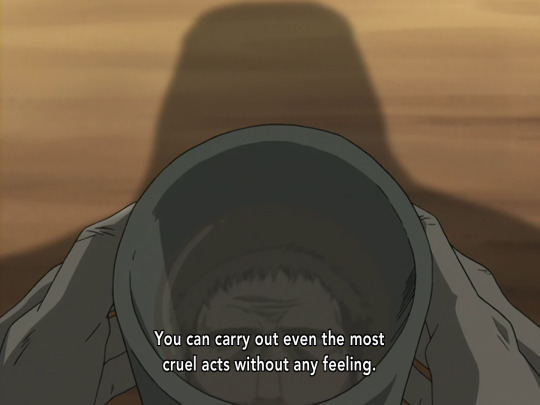


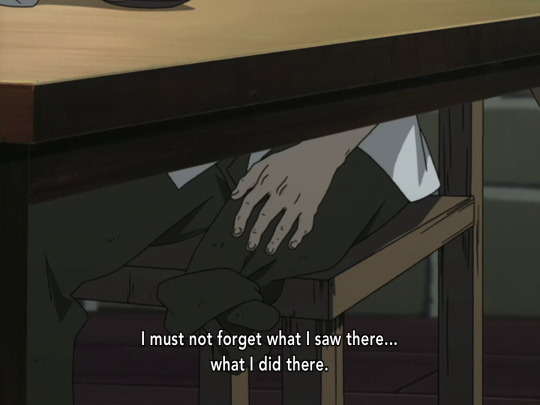
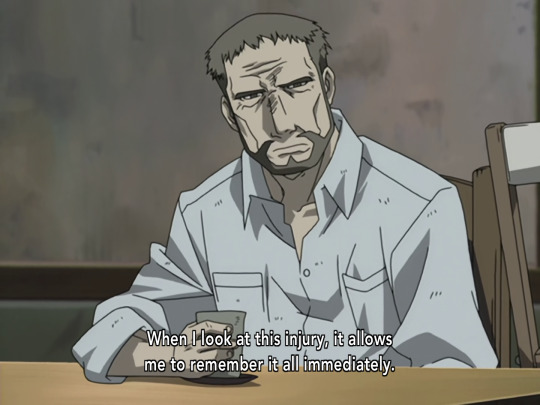
Okay see this is kind of more of what I wanted to see about the problems of enlistment! And perhaps Ed learning that he could just as well BE THAT.
One thing that I think I don't agree with this show on, like as a fundamental point--though there is still plenty of time for it to get more complex on this issue--AND DO NOT ATTEMPT TO CORRECT ME OR EXPLAIN TO ME--is I don't believe in indelible sin, and I don't believe in suffering as a form of atonement. I am too Jewish for all of this. You do not have to turn down a leg because it's functioning as an Opus Dei cilice. I am not saying the show isn't allowed to have this perspective, but when it comes to analysis and communication with a work, the window you're looking out of is as important as what you're looking at. I can't go along with this idea. I find it to be ultimately self-centered and a little self-pitying.
Sir, you seem harrowed, I'm not sure you need to be missing a leg to remember.
PLEASE DO NOT COMMENT ANYTHING THAT COULD EVEN REMOTELY LEAD TO ME REALIZING SOMETHING OR KNOWING SOMETHING NEW. Do not confirm, deny, draw attention to something I missed EVEN IF I SHOULD HAVE SEEN IT, contextualize in a cultural or historical way, anything. I hate that I have to be so specific but I am trying to experience this show totally clean. IF YOU SPOIL ME I WILL BLOCK YOU.
QUICK LINK TO THE SPOILER-FILLED FUNTIMES DISCORD HERE. THEY WOULD LOVE TO HEAR THE THINGS YOU KNOW AND YELL ABOUT ME
12 notes
·
View notes
Text
Shivers isn't an outsider in Harry's mind. It's not *the* voice of Revachol. Shivers is just an interpreter. It's Harry's connection with the city, but it's not *the* city.
In the same vein, Esprit de Corps aren't other cops, but Harry's ability to telepathically connect with them via cop infra-materialism. Yes, this is *totally* how it works, trust me.
Now, Inland Empire? That fucker *absolutely* has visions of the past, present, future, Remote Viewers Division and Dora Dolores Dei.
14 notes
·
View notes
Text
Black Hair-Story Month Special: Black Hair in Animation

Happy black history month all you happy people ! Every year, often with an idea from my patron weirdkev, I try to do something for black history month. Black lives, history and culture matter and I should dive into them more than once a year.
Still Kev pitched and paid for an excellent idea spotlighting a tredn in animation recently: episodes on black hair.
Now i'll be upfront: i'm a white middle aged balding man. I do not know much about hair let alone the proud history of black hair and the far more shameful history of what white assholes either shaming it as casual racisim or outright coopting it.
I do know I LIKE that we're getting stories like this, to learn something from my children's cartoons. That kids have something they can relate to and other kids can learn about without asking awkward questions that make their freinds deeply uncomfortable.. or in the case of one of these episodes learning that very lesson. It's why diversity in animation matters: personal experience adds that much more to a work, and we shouldn't try to homogenize shit to appeal to everyone. In a time when DEI is being treated as some sort of boogey man by the right, it's good to say "no inclusivity rips". So I will be covering these as they are: pretty good to truly excellent episodes of television and a wonderful short that woudln't be possible at all if we didn't let black creators say what they want and didn't hyperfixate on bein "relatable" to everyone.. aka white cis assholes and no one else.
So join me under the cut for five excellent tales of black hair maintence, casual prejudice, living hair, oblivoius men, heroism, and goblins.
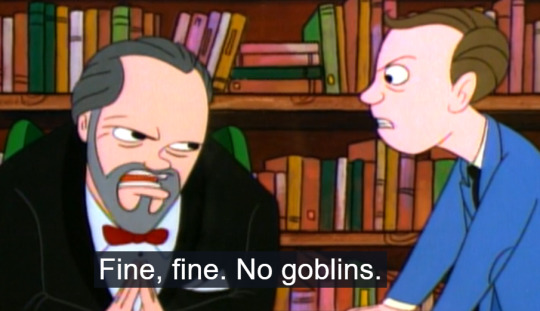
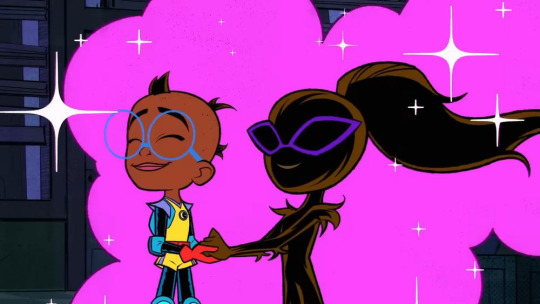
Hair Today, Gone Tomorrow (Moon Girl and Devil Dinosaur) MGADD was one of Disney's best shows and the beginning of it's marvel renisance in animation. After a hiatus following that spider-man animated series everyone forgot happened, it was a bold welcome return.... that disney canceled after 2 seasons while also shelving a trans rights episode so "parents can have those discussions when their ready"
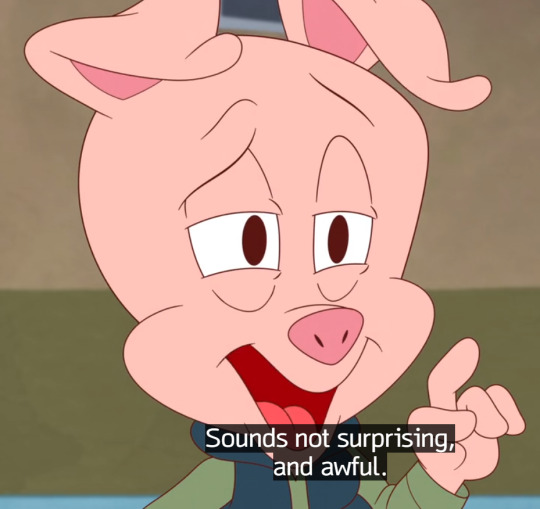
Yeah this show came out in 2023.. and is already over. It's sobering to realize how short a lifespan that was.. long enough to still have a decent run but way shorter for a show that had the praise, style and Laurence fishburne this show had. It took a solid concept from the comics that had a weak execution and made it something special. This episode highlights that. The premise is your standard kid genius plot: to get around a problem in their everyday life our science hero invents something that seemingly solves the problem but really just makes it worse till they confront the actual issue. To the series credit and my suprise it happens way less often than I thought: out of the series only 8/40. And in half of those the chaos isn't entirely her fault: in half of those it's someone else asking and in both cases things going wrong are the subjects fault: Devil took too much potion and Pops apparently does a mad science instead of being honest with his wife about his insecurities.
In the other half, Lunella dosen't use her creation: She creates a date for the dance, but it dosen't turn out well (Though I still count it as she intended to.. and also count the time she remolds said clone later in the season), and decides NOT to use a mind reading gadget for a sleepover. It only ends up an issue because Pops (Who unlike the above example didn't know about the superhero thing yet) mistook it for a remote because pops is good at many things but technology, respecting personal space and telling a dog apart from scottish david tenant alien dog are not among those things.
It also helps most of those cases that do happen.. are grounded in her insecurities in classic cartoon fashion: in this case a combination of being annoyed at her mom's instiance she take hair maintence seriously and a classmate calling her hair "messy" who Casey, Lunella's best friend, tells to go to her office. Which is code for "beat your head into the girls room stall till you learn your manners bitch", lead lunella to make a straightner.
There's also a reason why she can't just buy some her mom's terrified of it. literally. It's a fantastic cuataway as she throws the thing across the store like it's got a mummies curse. Let's be fair though: I'ts the marvel universe. That's absolutely possible.
I also like that Casey is supportive but repedeately emphasies Lunella's hair's fine: she just gets her friend needs to experiment. She helps her style and when the experiment goes wrong offers her a wig from her vault. I love that for some reason this child has a wig vault including a dolly parton and a punk look, thigns she'd never wear but hey you never know when you need to do cosplay.

Or just want to for funsies when you find it in a dying Party City. Whatever works.
Things going wrong in this case is "Lunella's hair falls out" or so she thinks. It instead gains sapience and commits a mass wig murder, killing both Sheba, Lunella's wig and all of Casey's other wigs to teach her a lesson. And to homage fatal attraction as all children's cartoons do.
Turns out Lunella's hair's sentient, and has become Mane, who is mad she never appricated her: didn't use the right comb, a hair bonnet, nothing. And she.. has a point. While trying to take over the world over it is a bit much even that's standard marvel buisness. I mean we wouldn't have paste pot pete if some guy hadn't decided to use his adhesive to do treason. And what kinda world would that be?
I also love the resolution: First Lunella admits her screw up to her mom.. not the living hair monster part, but everything else.. and despite being pretty militant about the hair thing and appricating it.. Adria and Mimi, her mom and grandma, are both sympathetic. Both get the pressures of the world's white nonsense: that her hair is too "messy" or "Unkempt" and both went to lengths to fit into that shit: Mimi tried hot combs, which sounds like pure hell and set her hair on fire and adria had a straightner accident. They both get it just happen and help her learn to appricate what she had: that yes hair takes effort.. but it's a part of her worth celebrating and it's something Lunella realizes: She liked it's bounce, it's look, how it fit in her helmet. You don't appreciate something like that till it's gone
Thankfully what took her hair wasn't neglect and male pattern baldness so unlike me she has a shot at getting it back. She first plans to use a relaxer, what both she and her mom goofed on using it.. but fighting it dosen't go well> While Devil easily ko's the hair dryer Mane uses as a sidekick mane morphs into a doppleganger and this mirror match is too much.. so Lunella instead.. apologizes. Is sincer and honest.. and thus gets her hair back. NO idea if her hair is somehow still sentient she just can't move but she's content, Lunella's content and in a nice bit of continuity Lunella uses a hair bonet the rest of the show.
Hair Today Gone Tommorow is an excellent episode. It set a high bar that only one other episode and the short cleared, covering a subject well, the prejudice one faces, in a fun way. The jokes are on point, including Casey's 40 wig funerals and Lunella's well meaning gym/science teacher's lesson boiling down to "robots amirite". It's excellent stuff and a good intro to the show if your curious to try it.
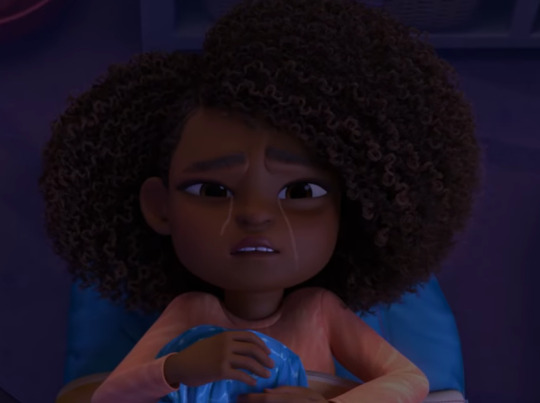
Hair Comes Trouble (Karma's World) Karma's World is one of two shows in this pile I hadn't seen before. It's also the weakest of all 5, though this episode's still great. It's just clear Karma's World is aimed at a younger audience without anything really there for adults. It was also produced and created by Ludracris.
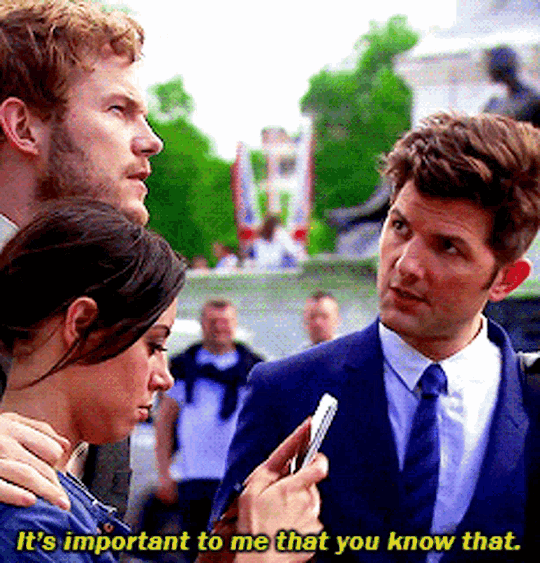
Karma's World is your standard aseop of the week show from what I can gather, about a middle schooler named Karma who wants to be a rapper and raps. And... not very well at times. The intro rap is painful and the ending rap is not better. Now is it the dumbest rap i've encountered in a cartoon? Not by a mile. I mean it dosen't have the human torch talking about how a girl has gone on to another while he sings his funky song. It's just eh.
That said the rap Karma has about her crisis and her hair is REALLY damn good with a nice beat and some excellent flow. The show could do better and I get this is for kids.. but making music for kids is no excuse. It's not a remote one. If Phineas and Ferb can make a good song an episode, so can you.
Plotwise the episode works as it touches on accidental microagressions: Karma has a sleepover with her friends which goes well.. till they play a fashion game on tablet and don't want to just.. do Karma's hair feeling it's too messy. And when Karma prepares to use her hair bonet, a device used to keep hair safe and curly, her friends baragge her with questions about her hair and thent ouch it without her permission, all acting like she's over reacting. Even newly minted bestie and main character Switch thinks she over reacted.. when Karma.. didn't. Her friends didn't MEAN bad, they were juts curious. It's a nicely nuanced conflict; Karma is absolutely right to both feel uncomfortable and to set boundries. Having someone randomly touch you is not okay in any context. But you get her friends didn't realize they were being offensive. their just kids. Kids say stupid shit.
So like Lunella karma wants to change though unlke Lunella Karma LIKED her hair at first... it's just insecurity creeping in. Thankfully a talk with her mom gets her to see her hair is fine, it's part of her etc... and that it's okay to set boundries. That's a lesson just to this episode but a valuable one in general and especailly in this context: It's okay to be honest about something you thought was uncomfortable and just because someone else thinks you overeacted does not mean you did. Your autonomy matters at any age. And a talk with Switch making things clear gets an apology and Karma.. is fine answering questions at lunch. But it's now on her terms instead of being barraged and made to cry. There's a line between curosity and taking honest questions, and making someone feel bad.
This episode was decent. I didn't really vibe with the show but again it's just.. not made for me. It's made well even if some of the raps were weak, but it's for small children and unlike say BLuey isn't built to go beyond that. It is what it is.
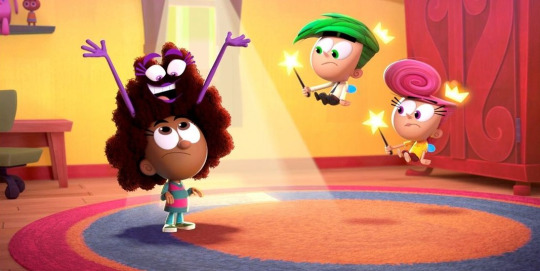
Trial and Hair-Or (Fairly Odd Parents: A New Wish)
I'm so happy to get to talk about A New Wish. From what i've seen of it, I fell behind quickly and will watch it in fully with my friend @jess-the-vampire one of these days (I've been busy and we've had other stuff take priority when we do have time to watch stuff), but what i've seen is excellent, with nice Peanuts Movie style animation that's pure gorgeous and is how you do a reboot: everything happened but it uses a fresh angle to bring it back in this case the simpliest way: Timmy naturally moved on, Cosmo and Wanda find a kid who needs them in the kind and enthuastic Hazel whose struggling at first with a new city, her brother moving to college, and slowly making friends.
A New Wish freshens up everything that's badly aged about the original: Hazel's parents are loving and simply work a lot, but still make time for her compared to Timmy's mostly absent and neglectful at best parents. The cruetly of the world is toned down to realistic levels, and Cosmo and Wanda are scaled back to earlier season levels and the time between series clearly helped their marriage. Gone are jokes about Wanda being a nag, Cosmo being miserable and Cosmo is still stupid, as he should be, but not callously so. He simply needs to, as hazel puts it in the episodes best gag "work on his active listening skills".
Hazel herself is a nice pivot from timmy: She has diffrent intrests such as french fries, scary movies and shojo manga, and tends to be less Selfish. Not that timmy was lacking in giving, he'd often help his family, but Hazel is way more warm hearted. She still has the same short sightness most kids do, but unlike Timmy tries to learn from past wishes. A simple character change and a shift forward in time make everything feel new and combind with the animation and humor, it's easily one of the best reboots i've seen and hopefully will come back for season 2
All this praise said Trial and Hair-Orr is weak plot wise. Joke wise i'ts fucking phenominal as Hazel wishing for special hair gets her sentient hair whose offended she wants to pizzaz it up with something other than a bow. Hazel's various hyjinmks trying to trap her hair, from a war style look to the old west are pure fun and her father's obession with bows is adorable: Her mom was SUPPOSED to help her but got called away and while he mans well.. the man knows nothing.
My problem is the episode tries to frame it like Hazel was ungreatful or didn't appreciate her hair like Lunella.. but she does. She loves her hair. She just wants to jazz it up a little. Unlike Mane her hair diana is just.. a massive dick whose very fussy. The jokes in this one work VERY well but the attempted heart just dosen't. It's an episode that could've worked better, but is okay at least as is. If nothing else it'll always have this
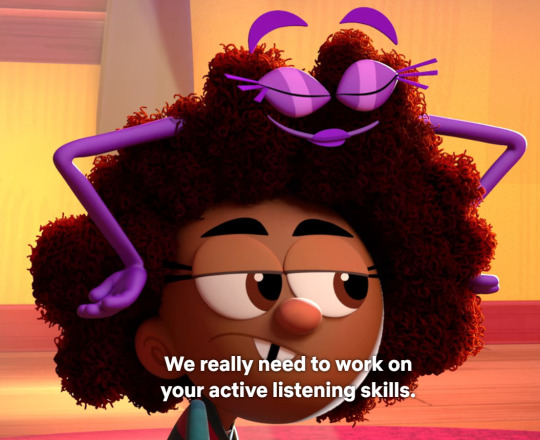
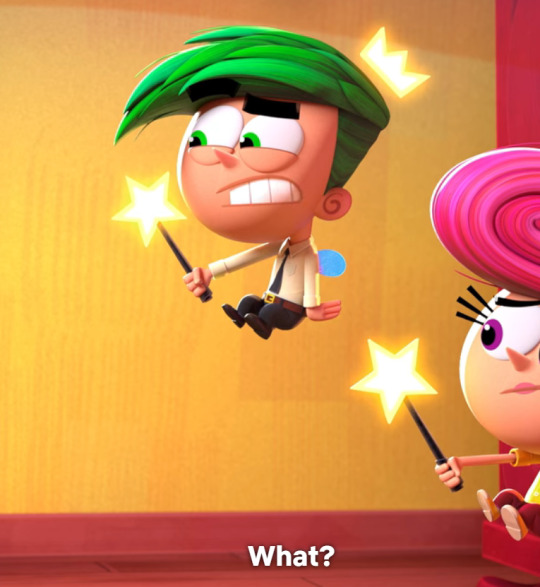
I missed this dipshit.
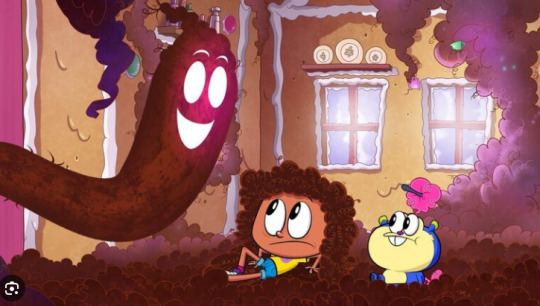
The Great Tangle (Zookie of Planet Ruby)
Before this I had never heard of this show.. and there's a reason for that. Once again Nick devalued one of it's shows.. but even for nick the way this show was treated is bafflingly. So this show was a co production with Nelvana that seemingly aired normally for it's canadian airings.. but over here rather than air it themselves nick sold it off to Amazon... who did no advertising for it. They gave not one iota of a shit about this series and it pisses me off. I expect that from Viacom, nick is riddled with shows the network threw away for stupid reasons despite being a success by anyone elses metric. But while Amazon Prime used to be wonky with their animated shows they've treated most decently. I mean invincible's budget could use a boost, stop that shit it's making you enough money to buy the moon, but animated shows generally aren't in horrifying danger of being canceled after one season which i'm aware is a bar so low James Cameron's gonna have to fish it out and raise it again, but that's where we are with animation right now.
I'm glad it came up though as Zookie of Planet ruby has vibrant as hell animation and a fun sweet silly tone. The short of the premise is Zookie, a gerbile like alien with magic powers, escaped his tyrinical world and king after watching the videos of Ruby, a young content creator. We've gotten to the point where "characters making videos' Isn't painfully cringy as a premise again, and the two's friendship is nice and wholesome. It's mostly an excuse for a galaxy hamster to learn life lessons and outwit a tyrannical dog king and a tween nightmare. Also he makes a squirrel able to talk.
This episode is one of the series few half hour episodes and it's excellent. It tackles thing from a similar but still distinct angle from Moon girl. Like Lunella ruby sees her hair as just.. hair and her weekly wash day as something that takes 80 years and isn't worth it. So she decides to solo it. Rubu's Mom well meaningly TRIES to stay out of it.. but is panicky the whole time and understandably concerned when her daughter just.. dumps all the product in her hair and is okay with it.
It's a nicely done conflict: Ruby like any kid dosen't understand why something takes forever. As a kid I HATED clothes shopping.. and I still do unless i'ts a t-shirt, but I get it takes forever for a reason and you need new clothes and kids grow out of them constantly. But her mom should've just been honest or at least insisted on teaching her everything first. It's nice to let your kid be intendent but you have to make sure they CAN do something they want to do themselves.
So while making a video Ruby jams a whole ass ginger bread house in there and can't get it out. Her Grandma.. just wants to use the hot comb and it's a nice show of how good a mom her mom is: While Ruby's Mom won't intervene, simply telling her daughter her hair needs TLC... she doesn't let her grandma use the hot comb aka traumatize the shit out of her. It's a low bar sure, most people shouldn't let their parents torture their children, but not every person can clear it.
This being the show that it is, Ruby's solution is to have her best friend use his magic butt sparkles, techincally tale but semantics, to make her hair okay. I also love the quick cutaway that shows Zokie just uses a painful machine for style and only dosen't for Ruby because her bones aren't built that way.
Instead he magics the hair which makes it grow, and grow and eventually envelop the town, fred and her house, leaving the two alone in a gingerbread house with a mysterious hair creature.
Said creature is the tangle in her hair that caused all this whose happy... and mildly upset Ruby wont' take over her. She also tries the creepy stalker route to that planning to keep her forever when Ruby understandably plans to RUN, RUN, RUNNNNN.
The solution naturally sin't that as her hair has smothered the town.. but to finally ask for help. It's only with her mom, more sparkle sparkle magic, and fred's grumbling can they start to fix the tangle.. and actually help her. It's only with love, understanding and patience that this works. Tangle goes away but she'll be back in like.. a week.
The Great Tangle is a fun story that tackles the issue from a very simple idea of "Why does hair care take so dang long". Because it's necessary to make hair good and simply takes a while. It also has a good joke for two, a lot of great animation. Admitely ZOPR isn't the funniest show to me personally.. but it does have great animation, fun characters and a lot of creative energy. This was the third show in this batch to do living hair.. but none of them had the hair take over the whole town and unlike the last two where the hair was kind of a jerk tangle was obesessive and went a bit too far.. but wasn't outright EVIL she simply didn't understand that kidnapping a child forever is frowned upon. She's more a sympathetic monster than a sympahtetic monster who goes right to taking over the world or just a dick.
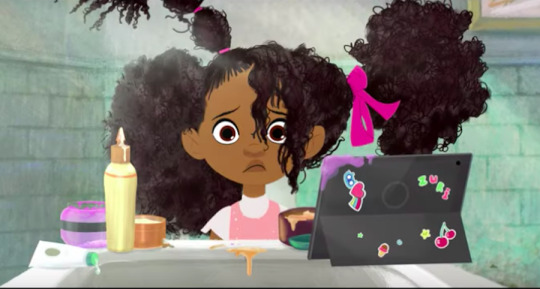
Hair Love
No celebration of black hair in animatoin would be complete without the wonderful academy award winning short. I have not seen i'ts spinoff series young love. I intend to and feel bad as it seemed to just.. stop at one season. Then again it's hard to tell if it's a viewership problem or David Zaslav just decided fuck it.
At any rate Hair Love is a truly excellent short following a little girl as she tries to get her hair ready using a hair blog... one revealed towards the end to be her mothers. It's a nice reveal as you can possibly figure it out... but it helps add a punch. She wants her hair nice for some reason... and that being part of it really helps explain it.
She tries but being a small children, that dosen't go well. She also has a cat but he's mostly there to meow disaprovingly at her dad, who tries his best or just a big bow but is clearly NOT the one who does this. He also gets into a boxing match with hair.
Hair Love is a sweet short about celebrating your hair, and about effort. The dad basically give sup but once he gets WHY his daughter is so determined, doubles down, uses his wife's videos and gets it done. It also has a truly incredible nad heartbreaking twist: the wife/mother.. is coming out of cancer treatment. The short implies and the series seems to confirm she's fine, it's at the very least in remission and her hair slowly grows back over the credits.. but it's the final button on the short that makes it all tie together. Hair Love is beautiful, worth watching.
Honestly.. all these episodes are worth your time. Moon Girl easily won with Hair Love a close second, The Great Tangle RIght behind it, the karma's groove ep after that and fop at the bottom.. but none of the episodes are bad and all tackle diffrent sides of black hair: Learning to apricate it, the challenges of accidental well meaning racism from your friends, proper matience, making sure your hair isn't an asshole, and that the time and effort is worth it for those you love. This is a wonderful collection of episodes and I was happy to review them. Thanks for reading and i'm pulling for you, we're all in this together.
#black history month#moon girl and devil dinosaur#karma's world#zokie of planet ruby#fairly oddparents#a new wish#hair love#young love
16 notes
·
View notes
Text
January 20, 2025
POTUS:
Retracted 78 previous executive orders, most regarding COVID-19 actions to ensure public safety, federal DEI programs, several EOs that held the executive branch accountable, climate change, immigration, and healthcare. Full list here.
Announced Cabinet picks: here
Required all federal employees to terminate remote working
Declared a national emergency on the southern border
Removed the US from WHO and the Paris Climate Agreement
Pardoned rioters from the January 6th Insurrection
Imposed new trade standards, supposedly prioritizing America: here
Declared a national energy emergency, ignoring many environmental regulations to lower the cost of energy and promote energy production
Gave the president the ability to remove Career Senior Executives who are deemed to have "failed" the president
Bolstered the death penalty
Signed an EO to stop birthright citizenship
Signed an EO to redefine the two sexes and stated the federal government will not recognize gender identity
Implemented the Department of Government Efficiency (DOGE)
Allowed natural gas fracking and drilling in Alaska again
Several EOs were signed to prevent immigration from the southern border
Temporarily ending offshore wind farm projects
Redistributed foreign aid
Ended government DEI programs and insist the government will be hiring on merit
Federally renamed the Gulf of Mexico to the Gulf of America and Mount Denali to Mount McKinley
Designated international cartels as global terrorists
Ended national emergency that imposed sanctions on settlers invading the West Bank
More details and the actual policies can be found here
SCOTUS:
The Supreme Court was closed
Congress:
2 bills were introduced: One meant to repeal the Protecting Americans from Foreign Adversary Controlled Applications Act. The other deals with a nuance finance issue.
Passed the Laken Riley Act, requiring aliens who are being charged with theft in the US to be taken into custody
Confirm the nomination of Marco Rubio for Secretary of State
Debate began on the Born-Alive Abortion Survivors Protection Act in the Senate. The law is meant to prevent healthcare professionals from failing to provide proper care in case a child survives an abortion
In the House of Representatives, 12 public bills were introduced: 5 were regarding the Internal Revenue Code of 1986, which deals with taxes. One was to advance the US strategy in the Pacific Islands. H. R. 563 is meant to discontinue the collection of records for discontinued firearms sales by the federal government. Others dealt with the law banning TikTok, residency requirements of officials, air pollution, labor representation, and funding for law enforcement to deal with auto theft
Further details can be found here
#us politics#president trump#congress#supreme court#potus#scotus#politics#us supreme court#us president
8 notes
·
View notes
Text
Team: Italian 2 Writer: Brie @briefle Artist: CC @ccssketchbooknstuff Beta: Moro @moro-the-sun Title: Na Pescatora, nu Folle i'llu Mare tràsinu 'nta nu bar. Link: https://archiveofourown.org/works/57002851 Ratings: Teen And Up Warnings: No Archive Warnings Apply Characters: GeminiTay, Grian Summary:
Una Pescatora, un Folle e il Mare entrano in un bar. C'è chi quasi annega, ma tutto bene qui! Nulla di rotto!
In un bar con luci al neon che lottano per rimanere accese ancora un'altra serata e bicchieri di vetro una volta cristallini diventati ormai opachi, due stanchi viaggiatori condividono un piatto di stuzzichini. Stasera il barista ha voglia di raccontare di nuovo la storia trita e ritrita di un piccolo porto di mare in qualche angolo di mondo sconosciuto, della Pescatora che vi ci aveva attraccato, e del Folle che l'aveva reso casa sua.
Al bancone uno dei due sembra molto interessato a sottolineare che, allora: no, non c'era nessun Folle. Il pescivendolo, perfettamente sano di mente, normalissimo, tra l'altro, che di sale in zucca ne aveva da vendere proprio. Accanto a lui una donna, che fa cenno al barista di portare un’altra vaschetta di patatine, ci tiene qui a precisare quanto sarebbe sorprendente se il sale che quel pazzo aveva in zucca fosse stato altro che tutta l'acqua di mare che si era dimenticato di sciacquar via.
Gli altri clienti erano più che altro grati dell'intrattenimento, a essere sinceri.
---
An Angler, a Madman and the Sea walk into a bar. Someone almost drowns, but it's all good! It was an accident!
In a bar with neon lights fighting to stay on for just another night and once crystal clear glasses now all fogged up from use, two weary travellers share a plate of appetizers. Tonight the bartender fells like telling the ever-so-familiar story of a small seaport in some remote corner of the world, the Angler that docked there, and the Madman that made it his home.
At the counter one of the two seems very keen on letting everyone know that nono, there was no Madman, ok? The so very normal fishmonger, perfectly sane of body and mind, had his head on so very straight, the sanest person on the curb. Next to him, a woman who was nodding to the barman to bring cup of chips, leans in to add how that fool leaned his ear to the sea so hard trying to listen to voices, she'd be surprised his head was still screwed on to his neck.
The regulars were mostly glad for the entertainment, to be quite honest.

18 notes
·
View notes
Text
David Smith at The Guardian:
Donald Trump didn’t need to wait for the black box flight recorder. He knew what caused the mid-air collision of a passenger plane and army helicopter that killed 67 people. Or he thought he did. “They actually came out with a directive – ‘too white’,” the US president told reporters on Thursday, seeking to blame former presidents Barack Obama and Joe Biden for including Black and Latino people in the federal workforce. “We want the people that are competent.” That it took Trump less than a day to exploit a tragic plane crash for his crusade against diversity, equity and inclusion (DEI) programs should come as no surprise. The 78-year-old president is on a mission to win the “culture wars”, acting with speed and ferocity to bring his rightwing agenda into every corner of American life. It is a form of shock therapy that aims to rewire society itself.
Less than two weeks back in office, an emboldened, unapologetic Trump has launched a series of executive orders and policy changes that broadly target DEI, education curricula and political protests. The actions aim to reverse so-called “woke” policies and restore “merit-based” systems. Trump said during a remote address to executives at the World Economic Forum in Davos, Switzerland: “My administration has taken action to abolish all discriminatory diversity, equity and inclusion nonsense – and these are policies that were absolute nonsense – throughout the government and the private sector.” The president has also moved to eliminate “radical gender ideology and critical race theory [CRT]” from the nation’s schools. He has targeted LGBTQ+ rights, making it official government policy that there are only two sexes while seeking to ban federal funding or support for youth gender-affirming care and ban transgender individuals from serving in the military. Trump’s sledgehammer, aimed at smashing decades of progressive gains, has made a mockery of “We are not going back” – the slogan of his vanquished election opponent, Kamala Harris.
Chris Scott, a Democratic strategist who was Harris’s coalitions director, said: “What it has made clear is that a second Trump term is working to turn America back into pre-civil rights America during the Jim Crow era. That’s what we’re seeing with a lot of these policies.” He added: “It is an absolutely terrifying time in this country. When we talk about ‘Make America Great Again’, a lot of folks understood what that means, particularly people of colour, particularly Black folks. We are on the precipice of going back, returning to our darkest times within this country.” [...] Trump’s election victory last year took this hostility from the fringes to the Oval Office. Despite gaining less than 50% of the national popular vote, the 47th president believes he has a mandate to impose a fundamental cultural realignment, not by increments but with sudden and overwhelming force. Trump’s administration has branded DEI initiatives in the federal government as “discriminatory”, “anti-American” and driven by a “far-left agenda”. He has ordered the elimination of all federal DEI programmes and related offices, placing staff on leave and removing related websites because they represent “immense public waste and shameful discrimination”. The order directs the administration to review which federal contractors have provided DEI training materials to government agencies and revokes the Equal Employment Opportunity order signed in 1965 by Lyndon Johnson. Trump directed agencies to stop using gender identity or preferred pronouns. And federal workers have been told to report colleagues who may seek to continue DEI programmes. There are signs that the assault is not confined to the government alone but seeping into wider society. Companies such as McDonald’s, Meta and Walmart have reportedly pulled back on DEI programmes in response to political pressure. It is a dramatic reversal from the diversity push that followed the police murder of George Floyd, an African American man, in Minneapolis in 2020.
In two weeks of 47’s term so far, Demented Donnie’s crusade against “wokeness” (eg. DEI and LGBTQ+ rights) has done calculable harm to America.
#Donald Trump#Trump Administration#Trump Administration II#Wokeness#Culture Wars#DEI#Diversity Equity and Inclusion#Executive Orders#Critical Race Theory#Schools#Military
7 notes
·
View notes